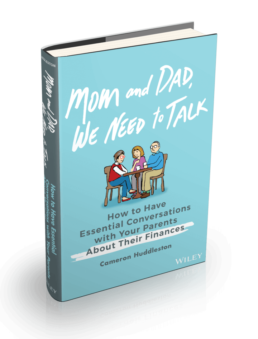I’ve often contemplated being a stay-at-home mom. The idea is appealing because it means I wouldn’t have to juggle work and kids, which – as any working parent knows – is not easy. I think about how I would have more time to come up with awesome crafts and activities I could do with my kids, to get my house organized, to make wonderful, well-balanced meals every night …
Then I think, “Who am I kidding? That ain’t gonna happen.” Aside from realizing that having more time wouldn’t turn me into the Martha Stewart of moms, I always talk myself out of the idea of being a stay-at-home mom because I don’t want to give up my financial independence. That’s really important to me.
But that doesn’t mean that I don’t think anyone should be a stay-at-home parent. In fact, it makes more sense financially for plenty of families to have one parent take care of the kids full-time. And if you’re a stay-at-home parent, you don’t need me to tell you about all of the other benefits because you already know.
However, even if you don’t mind giving up some financial independence to be a stay-at-home mom (or dad), you do need to take steps to boost your financial security. So make sure you do these things:
Get a Life Insurance Policy
Don’t assume that because you’re not earning an income that you don’t need a life insurance policy. If you’re not around, your spouse will have to pay someone to help with the kids. So you need to have a policy that’s big enough to cover those costs. (A term-life policy is likely your best best because it will be more affordable.)
Also make sure your spouse has a large enough policy to provide you with the financial support you will need. Coverage typically should equal eight to 10 times your total household income. So if your spouse earns $100,000 a year, you don’t even need a calculator to figure out that a policy with just $100,000 in coverage is not enough.
Open a Joint Bank Account
If you and your spouse don’t already have a joint bank account, you should open one for several reasons. Financial planners I’ve interviewed said the most important reason couples should merge their accounts is so they can be joined financially. Couples who keep separate accounts tend to struggle more to be good financial partners than couples with joint accounts.
But another important reason to have a joint account is to have access to money in case of an emergency – namely, the death of your spouse. If you and your spouse have separate accounts, you’ll likely have to go through probate court to get access to the money in his account when he dies – unless you’re name as the “payable on death” beneficiary on the account.
Here are more reasons you should have a joint bank account with your spouse.
Be Engaged in Your Family’s Finances
Numerous studies and surveys have found that women are more likely to make day-to-day financial decisions for their households – like figuring out how much to spend on groceries or clothing for the kids.
But I know plenty of women who take a hands-off approach when it comes to longer-term financial planning. In fact, a study by UBS Wealth Management found that “women in couples don’t take as active a role in investing, which is the foundation of financial security.”
Even if you don’t want to spend date night discussing stocks, you should at least know how much your spouse is saving for retirement and whether that nest egg will be big enough to support the both of you when he retires. You need to know what sort of accounts he has and how to access them, if necessary. And you need to discuss long-term goals so you can align day-to-day spending with those priorities.
Save for Emergencies
You need to make sure you have a stash of cash in a savings account to tide your family over in case your spouse loses his job – or if any other emergency arises. Most financial planners recommend having enough to cover six months’ worth of expenses. You don’t have to set that much aside at once, though.
You can build your emergency fund by funneling your tax refund into a savings account, actually setting aside the money you save by cutting household expenses or using any of these other strategies.
Save for Retirement
Most of us don’t get married with the expectation that we’ll get divorced someday. But let’s be honest – things happen. So if you’re earning any money (blogging, watching other people’s kids, selling your awesome crafts, whatever) that your family doesn’t need to pay the bills, stash it in a retirement account of your own.
You can open a Roth IRA with an investment firm such as Vanguard or Fidelity and contribute up to $6,000 per year if you and your spouse have a combined modified adjusted gross income of less than $183,000. (The amount you can contribute phases out as you earn between $193,000 and $203,000, at which point you can’t contribute.)
Even if you don’t have earned income, your spouse can contribute to a Roth IRA for you. Or if you earn more than $6,000 and want to stash it all in a retirement account, you can open a SEP IRA or solo 401(k), which have higher contribution limits.
Don't Miss Out! ORDER NOW!
"An excellent step-by-step guide to navigate what can be time-consuming, uncomfortable conversations."
- Michelle Singletary, The Washington Post
Related Posts

Cameron Huddleston
I am the author of Mom and Dad, We Need to Talk: How to Have Essential Conversations With Your Parents About Their Finances. I also am an award-winning journalist with 20 years of experience writing about personal finance. My work has appeared in Kiplinger’s Personal Finance, Forbes.com, Yahoo!, MSN, and other online and print publications.




My mom was a stay-at-home mom when I was a kid. A few years ago, after almost 40 years of marriage, my parents separated. My mom’s retirement accounts are much smaller than my dad’s. I’m glad to see that you mentioned saving for retirement as a priority for stay-at-home parents because it’s definitely true. Thanks for the article.